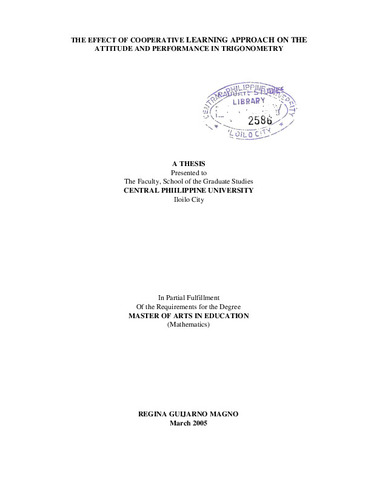The effect of cooperative learning approach on the attitude and performance in trigonometry

Page views
1,056Date
2005Author
Thesis Adviser
Defense Panel Chair
Share
Metadata
Show full item record
Abstract
This study was conducted to investigate the effect of cooperative learning approach on the attitude and performance of students in trigonometry.
This experimental study was conducted from February 10 - to March 22,2003. The respondents of this study were the thirty first year students of Computer Programming Course of West Visayas State University, Janiuay Campus. The students were matched paired on the basis of their final grade in college algebra to establish equality between two groups. The students were randomly assigned to the experimental and control groups by tossing a coin. Fifteen students were assigned in the experimental and fifteen students were also assigned to the control group. The experimental group was taught using cooperative learning method while the control group was taught using the traditional method. The subject matter, exercises, and tests were the same for both groups. Both classes were handled by the researcher and utilized the one and a half hour classes at two consecutive time schedules.
The pretest - posttest control group design was used in the study. Data were gathered using a 35-item teacher made test to measure the performance in trigonometry, and a 5-point Likert scale questionnaire on attitude towards mathematics. Means, standard deviation, frequency counts and percentages were used for the descriptive analysis.
T-test was used to determine the significance of the differences between the variables identified. Pearson’s r was used to determine the significant relationship between the attitude towards mathematics and the performance in trigonometry. The significance level of all tests was set at .05 level.
Findings
This study revealed that before the treatment, the performance level of students who were taught using the cooperative learning approach was satisfactory and the performance level of those who were taught using the traditional approach was also satisfactory. After the treatment, study showed that the performance level of students who were taught using the cooperative learning approach was very satisfactory and those who were taught using the traditional approach was also very satisfactory. Cooperative learning approach has no significant effect on the attitude and performance of students. However, it helped improved student’s performance in trigonometry based on the result of posttest mean score in achievement test.
Before the treatment, the attitude towards mathematics of the experimental group was positive and that of the control group was also positive. Both the experimental and control group remained positive in their attitude towards mathematics after the treatment.
Using t- test for mean differences, study showed that there was no significant difference between the pretest and the posttest mean score in the achievement test of the experimental and the control groups. While there was also no significant difference xii xiii between the pretest and posttest mean scores in the attitude test of the experimental and control groups.
Further, results also revealed that there was no significant difference between the gains in the pretest and posttest mean scores in the achievement and attitude tests of the experimental and control groups. The study also revealed that attitude is not significantly related to performance in trigonometry. Students in both experimental and control groups have positive attitude towards mathematics before and after the treatment. There was no change in their attitude after the treatment.
Conclusions
Based on the findings, both the cooperative learning and traditional approaches helped improved students’ performance in trigonometry. There was no significant difference in the changes in the performance of students taught using cooperative learning and the performance of those who were taught using the traditional approach. It can be concluded therefore that the use of cooperative learning approach in teaching trigonometry is as effective as the traditional approach. Moreover, students’ attitude towards mathematics was not found to be significantly related to students’ performance in trigonometry. Despite the positive attitude of the students towards mathematics, this positive attitude has nothing to do with their performance in trigonometry.
Recommendations
Since it is concluded that cooperative learning approach is as effective as the traditional approach, this teaching strategy can be used as an alternative teaching strategy in teaching mathematics.
Further studies on the use of cooperative learning approach should be conducted with more number of respondents in college level, longer time frame and wider scope of subject matter in different areas of mathematics.
Description
Abstract only
Suggested Citation
Magno, R. G. (2005). The effect of cooperative learning approach on the attitude and performance in trigonometry (Unpublished Master's thesis). Central Philippine University, Jaro, Iloilo City.
Type
ThesisSubject(s)
Department
School of Graduate StudiesDegree
Master of Education major in MathematicsShelf Location
GSL Theses 378.242 M275
Physical Description
xiv,74 leaves

